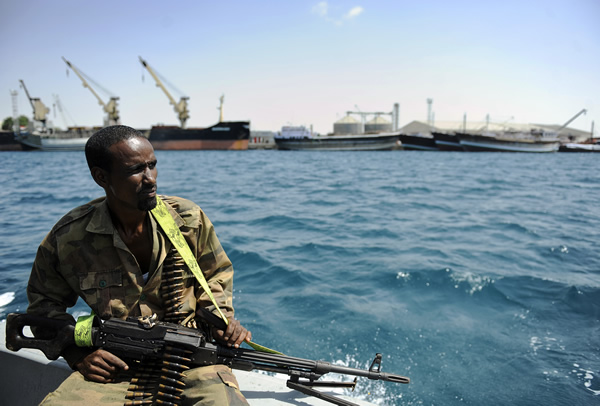Somali coastguard (Newscom)
When pirates off the Nigerian coast abducted two Americans on an oil ship early Thursday morning, resulting news coverage focused U.S. public attention on surging piracy and lawlessness in the Gulf of Guinea. The kidnappings, however, are simply the latest reminder that the Gulf of Guinea has emerged as the world’s piracy hotspot.
Over the past decade, piracy off the coast of Somalia dominated the focus of public attention and maritime security efforts. Recently, however, the frequency of pirate attacks in the region has dropped off—reaching its lowest point since 2006.
Meanwhile piracy in the Gulf of Guinea is swelling, threatening a vital shipping lifeline for a dozen countries and targeting vessels that carry nearly 30 percent of all U.S. oil imports.
Despite parallels to Somali piracy, attacks in the Gulf of Guinea take place within a different operational and political context. Understanding these differences is critical when exploring policy prescriptions.
- Pirates’ objectives. Pirate attacks originating off Somalia involve seizing ships in passage and holding their crews for high ransom. In contrast, West African pirates primarily focus on stealing cargo and siphoning oil. This behavioral divergence allows West African pirates to operate in shallow territorial waters, making them less vulnerable to the navy-heavy strategy credited with stemming the tide of piracy in Somalia.
- Political environment. In Somalia, piracy sprung from anarchy; in West Africa, pirates are able to take advantage of a well-established illicit political economy. They enjoy access to pre-existing international criminal networks and close ties to the shipping industries. Consequently, attacks are better coordinated, executed with precision, and oftentimes impossible to trace. West Africa’s criminal organizations have deep international ties, and they provide pirates access to extensive intelligence and allow for the storage and black-market sales of pirated goods. Additionally, due to drug sales and trafficking, criminal networks wield financial leverage with local governments and militaries, undermining the rule of law.
There are certainly benefits to maritime security efforts, including the presence of private armed security personnel aboard ship, increased international naval patrols, and the implementation of best management practices. These efforts are likely to reduce hijackings and attacks, but in the long term, effectively safeguarding maritime traffic requires a balanced public–private effort with the use of force limited to protecting commerce and maintaining freedom of the seas. Also required is an effective strategy to resolve West Africa’s troubles and establish and bolster the rule of law.
Source material can be found at this site.










